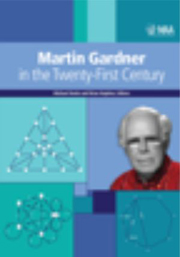Book contents
- Frontmatter
- Preface
- Contents
- I Geometry
- II Number Theory and Graph Theory
- III Flexagons and Catalan Numbers
- IV Making Things Fit
- V Further Puzzles and Games
- 24 Cups and Downs
- 25 30 Years of Bulgarian Solitaire
- 26 Congo Bongo
- 27 Sam Loyd's Courier Problem with Diophantus, Pythagoras, and Martin Gardner
- 28 Retrolife and The Pawns Neighbors
- 29 RATWYT
- VI Cards and Probability
- VII Other Aspects of Martin Gardner
- Index
- About the Editors
26 - Congo Bongo
from V - Further Puzzles and Games
- Frontmatter
- Preface
- Contents
- I Geometry
- II Number Theory and Graph Theory
- III Flexagons and Catalan Numbers
- IV Making Things Fit
- V Further Puzzles and Games
- 24 Cups and Downs
- 25 30 Years of Bulgarian Solitaire
- 26 Congo Bongo
- 27 Sam Loyd's Courier Problem with Diophantus, Pythagoras, and Martin Gardner
- 28 Retrolife and The Pawns Neighbors
- 29 RATWYT
- VI Cards and Probability
- VII Other Aspects of Martin Gardner
- Index
- About the Editors
Summary
An expedition into Congo uncovered a treasure chest in the shape of a regular octagon. At each corner was a bongo drum. A scroll attached to the chest, written in French, explained that there was a genie inside each bongo drum. A genie is either standing upright or doing a handstand. One may strike a number of bongo drums at the same time. When a bongo drum is struck, the genie inside will change its posture from right side up to upside down, or vice versa. The treasure chest will open if and only if all genies are right side up, or all are upside down. However, each time some bongo drums are hit the treasure chest will spin rapidly on its vertical axis. As the bongo drums are all identical in appearance, after the rotation it is impossible to tell which of them had just been hit.
Unfortunately, the scroll did not record the exact procedure by which the treasure chest might be opened. However, it mentioned that such a procedure had been documented. This document was considered so valuable that it was put inside the treasure chest for safekeeping. It was a lot safer than was originally thought.
The sponsor of the expedition was definitely not pleased with the current state of affairs, so she hired a team of mathematicians to try to open it. The task was seemingly hopeless, and many gave up, until Dr. Jacob Ecco arrived with his sidekick, Professor Justin Scarlet.
- Type
- Chapter
- Information
- Martin Gardner in the Twenty-First Century , pp. 195 - 200Publisher: Mathematical Association of AmericaPrint publication year: 2012



